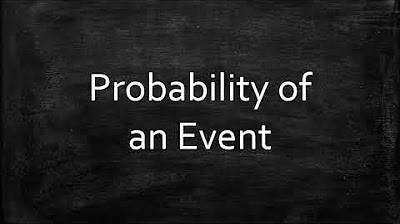Approaches of Probability | Types of Probability | Classical | Empirical | Statistical | Subjective
Summary
TLDRThis video script discusses the various approaches to understanding probability, including classical, empirical, and subjective methods. It explains the classical approach by using the example of a coin toss, emphasizing the importance of understanding the types of events and the concept of equal likelihood for outcomes. The script also touches on the conditions and limitations of the classical approach and introduces the viewer to the empirical and subjective approaches, suggesting that personal beliefs and experiences can influence the calculation of probabilities.
Takeaways
- 😀 Introduction to different approaches to probability.
- 🧮 Classical approach: Calculating probability based on prior knowledge.
- 🪙 Example of tossing a coin to explain equally likely outcomes.
- 📊 Mutual exclusivity condition in classical probability.
- 🔢 Calculating probability using classical approach formula.
- 🔄 Empirical approach: Using relative frequency to estimate probability.
- 🔬 Example of a production machine to explain empirical approach.
- 🔁 Differences between classical and empirical approaches.
- 🌟 Subjective approach: Calculating probability based on beliefs and experiences.
- 🎥 Encouragement to watch related videos on statistics for more understanding.
Q & A
What are the different approaches to probability discussed in the video?
-The video discusses the Classical, Empirical, and Subjective approaches to probability.
What is the Classical approach to probability?
-The Classical approach to probability is based on equally likely outcomes. It calculates the probability of an event by dividing the number of favorable outcomes by the total number of possible outcomes.
What is an example of a simple event used in the Classical approach?
-An example of a simple event in the Classical approach is tossing a coin, which has two possible outcomes: heads or tails.
What are the conditions that apply in the Classical approach?
-The conditions in the Classical approach include that the outcomes must be equally likely, mutually exclusive, and finite in number.
How is the probability of an event calculated under the Classical approach?
-The probability of an event is calculated by dividing the number of favorable outcomes for the event (A) by the total number of outcomes (B), which is expressed as P(Event A) = A/B.
What is the Empirical approach to probability?
-The Empirical approach to probability is based on relative frequency. It involves calculating the probability of an event based on the observed outcomes in a large number of trials.
How does the Subjective approach differ from the other two approaches?
-The Subjective approach to probability is based on personal beliefs and experiences. It does not require equally likely outcomes and can be influenced by subjective experiences and judgments.
What is the significance of the number of trials in the Empirical approach?
-In the Empirical approach, the number of trials is significant because it helps in approximating the probability of an event. The more trials conducted, the more accurate the approximation becomes.
How does the video explain the concept of 'mutually exclusive' outcomes?
-The video explains 'mutually exclusive' outcomes as those outcomes that cannot occur at the same time, ensuring that the total number of outcomes is finite and well-defined.
What is meant by 'finite number of outcomes' in the context of the Classical approach?
-A 'finite number of outcomes' refers to the total number of possible results being limited and countable, which is a requirement for the Classical approach to calculate probabilities accurately.
How can one determine the probability of a coin toss resulting in heads using the Classical approach?
-Using the Classical approach, the probability of a coin toss resulting in heads is determined by recognizing that there are two equally likely outcomes (heads or tails), and since heads is one of them, the probability is 1/2 or 0.5.
What is the role of personal beliefs in the Subjective approach to probability?
-In the Subjective approach, personal beliefs play a crucial role in determining the probability of an event. It reflects an individual's degree of belief that an event will occur, which can be influenced by their experiences and biases.
Outlines

This section is available to paid users only. Please upgrade to access this part.
Upgrade NowMindmap

This section is available to paid users only. Please upgrade to access this part.
Upgrade NowKeywords

This section is available to paid users only. Please upgrade to access this part.
Upgrade NowHighlights

This section is available to paid users only. Please upgrade to access this part.
Upgrade NowTranscripts

This section is available to paid users only. Please upgrade to access this part.
Upgrade NowBrowse More Related Video
5.0 / 5 (0 votes)





